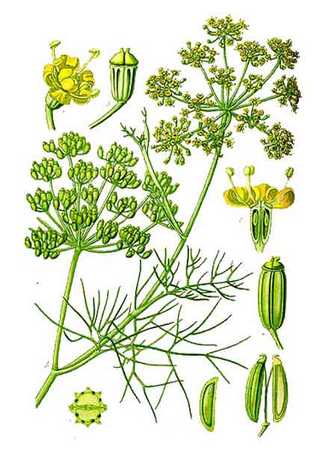Fennel – Fennel pharmacy – Feniculum vulgare Mill.
Perennial herb up to 150-180 cm, families zontichnыh (Apiaceae). Cultivated as essential oil and medicinal plants. Medicinal raw materials are the fruits of fennel ordinary, as well as the fruits of dill.

Fennel – Chemical composition
The fruits of fennel contain essential oil, consisting of anethole, fenxona, pinene, metilxavikola, camphene, phellandrene and other terpenes, and fatty oil, composed of oleic, linolenic, petroselinic, stearic and palmitic acid. In fruits also found traces of anisic acid, anisic aldehyde and ketone.
Fennel – Pharmacological properties
The chemical composition and pharmacological properties of the fruit fennel and dill are very close. At least on the effect of drugs from these plants on the activity of the gastrointestinal tract no significant differences can not be established. Herbal medicines from the fruits of dill pharmacy (Fennel) Horticultural and enhance the secretion of digestive glands, has choleretic, antispasmodic and diuretic effect, and regulates motor activity of the intestine, have some antibacterial effect.
Besides, fennel fruit calming effect on the central nervous system. The fruits of dill and a dedicated one drug "Anetin" have the advantage of antispasmodic activity, give clear koronarorasshiryayuschee and peripheral vasodilator effect.
Fennel – Use in medicine
Fennel fruit herbal medicines used in diseases of the gastrointestinal tract, accompanied by spasms of the intestine, meteorizmom, dyspepsia, pain in the gut (spastic colitis, intestinal colic in children, and others.). Preparations fennel in combination with other medicinal herbs prescribed for upper respiratory tract diseases, dry bronchitis thinning sputum and improving its expectoration.
Infusions and decoctions of dill also prescribed to improve appetite and digestion, eliminate spasms of the stomach and intestines, for carminative effect, increase the secretion of gastric and pancreatic juices and bile secretion. There are observations about the soothing effect of herbal medicines fennel in some patients, as well as the expression of its expectorant properties and ability to increase lactation in nursing mothers. Anetin infusion of herbs and dill, Besides, used for milder forms of chronic coronary insufficiency, with initial stages of hypertension.
Fennel – Formulations, Dosing and Administration
The infusion of fennel fruit: 10 g (2 tablespoons) the fruit is placed in an enamel bowl, Pour 200 ml (1 glass) hot boiled water, capped and heated in boiling water (in a water bath) 15 m, cooled 45 min at room temperature, filter, the remaining raw materials squeeze. The volume of the resulting infusion was adjusted with boiled water to 200 ml. The prepared infusion stored in a cool place no more than 2 d.
Take in the form of heat 1/3 cup 3-4 times a day as an expectorant and carminative.
Fruit stored in dry, cool place.
Oil Fennel. Oil Voloska dill. Essential oil, obtained by distillation of crushed fennel fruit. It contains up to 60 % anethole. Transparent colorless or yellowish liquid is easily movable with a strong peculiar smell, napominajuщim buoy Anne. Taste first bitter-camphor, then sweet. Applied with flatulence and as an expectorant, sometimes - to improve the taste in medicines.
Water ukropnaya. Structure: 1 part of dill oil to 1000 parts water. Colorless, clear or slightly cloudy liquid peculiar aromatic odor, sweet, and then the bitter taste, neutral. Applied with flatulence and as an expectorant.
